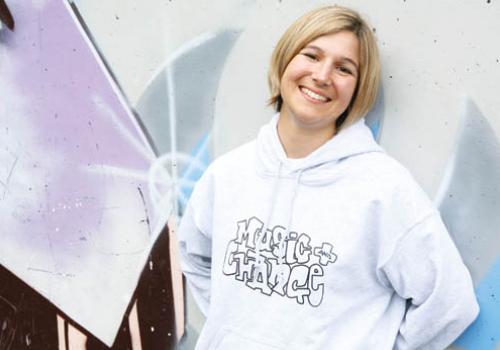Home >> News >> 2011 >> Jul >> Street therapy reaches 'untouchables' - Psychologist Charlie Alcock uses NYC gang experience on Rowley Way estate
Street therapy reaches 'untouchables' - Psychologist Charlie Alcock uses NYC gang experience on Rowley Way estate

A PSYCHOLOGIST who went to work with notorious New York street gangs the Bloods and Crips has brought her experience to the Rowley Way estate in Swiss Cottage.
Charlie Alcock told a meeting at the Town Hall how her studies in America inspired her to start a new kind of charity in Camden, which employs hard-to-reach young people to persuade their peers not to join gangs.
Struck by the poor mental health of many violent young people, the 31-year-old clinical psychologist decided to take treatment or “street therapy” to them wherever they would feel comfortable – whether in schools, on buses or park benches.
Speaking at a meeting of Camden’s Community and Police Consultative Group (CCPCG) on Monday night, Dr Alcock described how a conversation with a New York gangster led to the launch of her Camden-based charity, Music and Change (MAC) UK.
“One day one of the members turned around to me and said: ‘You expect me to tell you everything in my head but you don’t know me. It’s people like you that put our lives at risk.’
“I came back to London with the question: how can I work with young people in a way that’s acceptable to them and keeps them safe?
“I found myself on Rowley Way. There was a group of young men waiting at the entrance to the estate and they spat at me. I was really intimidated as any young middle-class woman would be. But that was the beginning of our charity.”
Dr Alcock started hanging around on the estate trying to get the attention of young people. Six months later she had persuaded a group of so-called “untouchable” youths to join her in running activities such as cooking, gym, football, theatre and music.
Music and Change works intensively with up to 30 young people aged between 14 and 30 for up to two years. Street therapy is central to the whole project, with young people self-referring and deciding when, where and for how long they would like to meet.
Dr Alcock said: “Young people who offend are as much victims as they are perpetrators. One in three young people who offend have a mental health need when they offend.
“These young people often come into contact with mental health services when they arrive in court and it is often far too late.”
Mark, 25, who has been involved with MAC, told the meeting: “I was around a lot of undesirables and on a very negative path. My mental health was not at a level many people would consider to be stable. Then I got involved with Charlie. It started really small but slowly we started to see something could grow.
“My life has completely changed since then. I’m in university and I’ve got structure thanks to this organisation.”
Published: 21 July 2011
by JOSIE HINTON




Comments
Post new comment